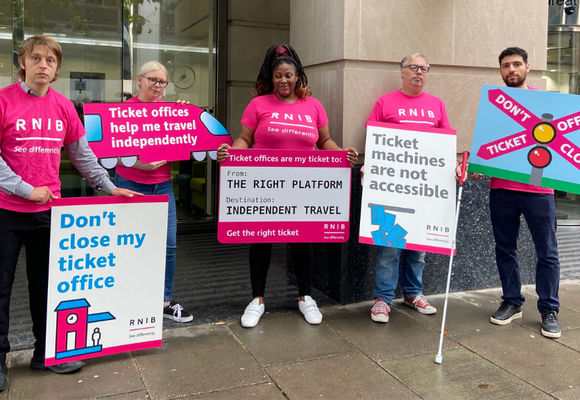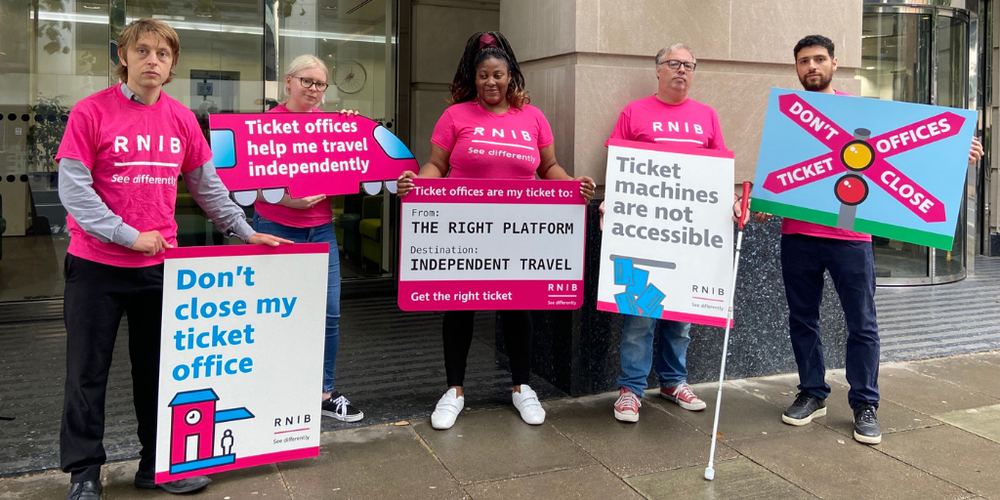Autumn Budget 2025: What it means for blind and partially sighted people
The Chancellor Rachel Reeves has announced the 2025 Autumn Budget, setting out UK Government plans for spending, taxation, and public services. We’ve been analysing what the announced changes mean for blind and partially sighted people across the UK.
What was in the budget?
Cost of living
RNIB welcomes the news that energy bills will fall from April next year, with measures expected to cut average household costs by around £150. However, this will not come soon enough to help people struggling this winter. We also welcome the extension of the £150 Warm Home Discount to an additional 3 million households – offering some relief to blind and partially sighted people who face high energy costs.
We also note the increases to the National Minimum Wage and the National Living Wage. While these are positive steps, RNIB continues to call for a social energy tariff to provide targeted support for disabled people.
Welfare and benefits
RNIB welcomes that the UK Government is no longer tightening eligibility for Personal Independence Payment (PIP), following relentless campaigning by disabled people. Changes to PIP are still planned, but a review involving disabled people is only just being set up and will not report until late summer 2026.
The boost to the standard Universal Credit (UC) allowance (set to rise by over 6 per cent from April 2026) is positive, as are increases of 3.8 per cent to other working-age and disability benefits, including PIP, Attendance Allowance, and Disability Living Allowance. Yet the boost to the standard UC allowance will not benefit new claimants receiving the UC health element, which will be halved and then frozen from April onwards.
Lengthening PIP award review periods is a step forward, as frequent reviews cause anxiety for people with sight loss, whose condition is unlikely to improve. RNIB believes that people with evidence of sight loss should not have to undergo repeated unnecessary assessments, which would also save costs for the DWP.
We're concerned about the plan to increase face-to-face assessments, as these can lead to poor decisions if informal observations are not addressed. RNIB believes all assessment methods – face-to-face, telephone, and video – should be available and optional, and we’ll seek reassurance that reasonable adjustments are offered for those who find in-person appointments difficult.
Furthermore, we're pleased with the uprating of the Blind Person’s Tax Allowance by 3.8 per cent but continue to call for eligibility to be widened to all those certified with sight impairment.
NHS and eye care
We welcome the £300 million investment in NHS technology and the focus on digital innovation, particularly the development of a Single Patient Record. This could make it easier for blind and partially sighted people to have their communication needs recognised and met across the NHS. We also welcome the freeze on prescription charges.
The creation of 250 new neighbourhood health centres is part of the implementation of the 10 Year Plan for the NHS, but we urge that optometry is included and that these centres help connect people to vision rehabilitation services.
Social care
It’s disappointing the Chancellor’s Budget ignored social care. Funding for adult social care must go hand in hand with NHS investment, especially as services are under strain. Vision rehabilitation is vital, helping blind and partially sighted people adjust to sight loss.
Too many wait too long for support, leaving lives on hold. RNIB urges the government to include vision rehabilitation in health and social care plans and improve integration between secondary and social care, so no one is left behind.
Vivienne Francis, RNIB’s Chief Strategy and Public Affairs Officer, said:
“We’re hugely concerned about the deafening silence around adult social care services in today’s budget. Already local councils don’t get the resources and guidance needed to provide essential vision rehabilitation services to people coming to terms with sight loss.
“If this continues, thousands of people will be stuck waiting many months for vital support such as using a white cane and skills for living independently.
We know that without this, people can become isolated at home and lose confidence – having their lives put on pause. We can’t let this continue.”
Mental health
Mental health was notably absent from the Chancellor’s Budget. While investment in NHS services is positive, it's disappointing that there was no specific commitment to mental health support. The emotional impact of sight loss is well documented, yet too often overlooked in practice.
Transport
Regulated rail fares in England will be frozen for a year from March 2026, meaning no increase to the price of season tickets and key return fares. The £3 bus fare cap will also continue until March 2027, which will help keep public transport more affordable for blind and partially sighted people.
Changes to the Motability scheme were announced, with luxury vehicles being removed from the scheme. While some tax breaks for Motability users will be limited from July 2026, essential VAT reliefs will remain and vehicles adapted for wheelchair or stretcher users will not be affected. Importantly, disability benefit payments and eligibility are unchanged.
The Budget included further investment in electric vehicle charging infrastructure. RNIB maintains that any installations of electric vehicle charging points should be done accessibly and without risk of becoming an obstacle for people with sight loss when navigating their local area.
Digital ID
The Budget confirmed the introduction of a national Digital ID scheme, intended to make it easier for people to access government services and support the move towards mandatory digital ‘right to work’ checks. RNIB is concerned that Digital IDs may create additional barriers for blind and partially sighted people - especially those who are digitally excluded. It's vital that Digital IDs are designed accessibly from the outset, so that all blind and partially sighted people can fully utilise this new form of identification.
Education
We're pleased the UK Government is taking steps to address local council funding deficits for Special Educational Needs and Disabilities (SEND) support, but we're concerned about inconsistent support for children and young people with vision impairment, especially as demand for SEND support rises and some vision impairment services face budget cuts.
The Budget’s £5 million for secondary schools to increase book supplies and the renewed commitment to a library in every primary school are positive steps, but it's vital that this funding is used to provide accessible formats, including expanding the reach of RNIB Bookshare, so more children can access the curriculum and enjoy reading.
We also welcome an £18 million investment to improve playgrounds but urge that accessibility is prioritised. The announcement of over £8 billion for early years provision is significant, and RNIB stresses that early specialist support for babies and young children with vision impairment is crucial for their development and future opportunities.
For advice and support, contact our Helpline on 0303 123 9999 or visit http://www.rnib.org.uk.







